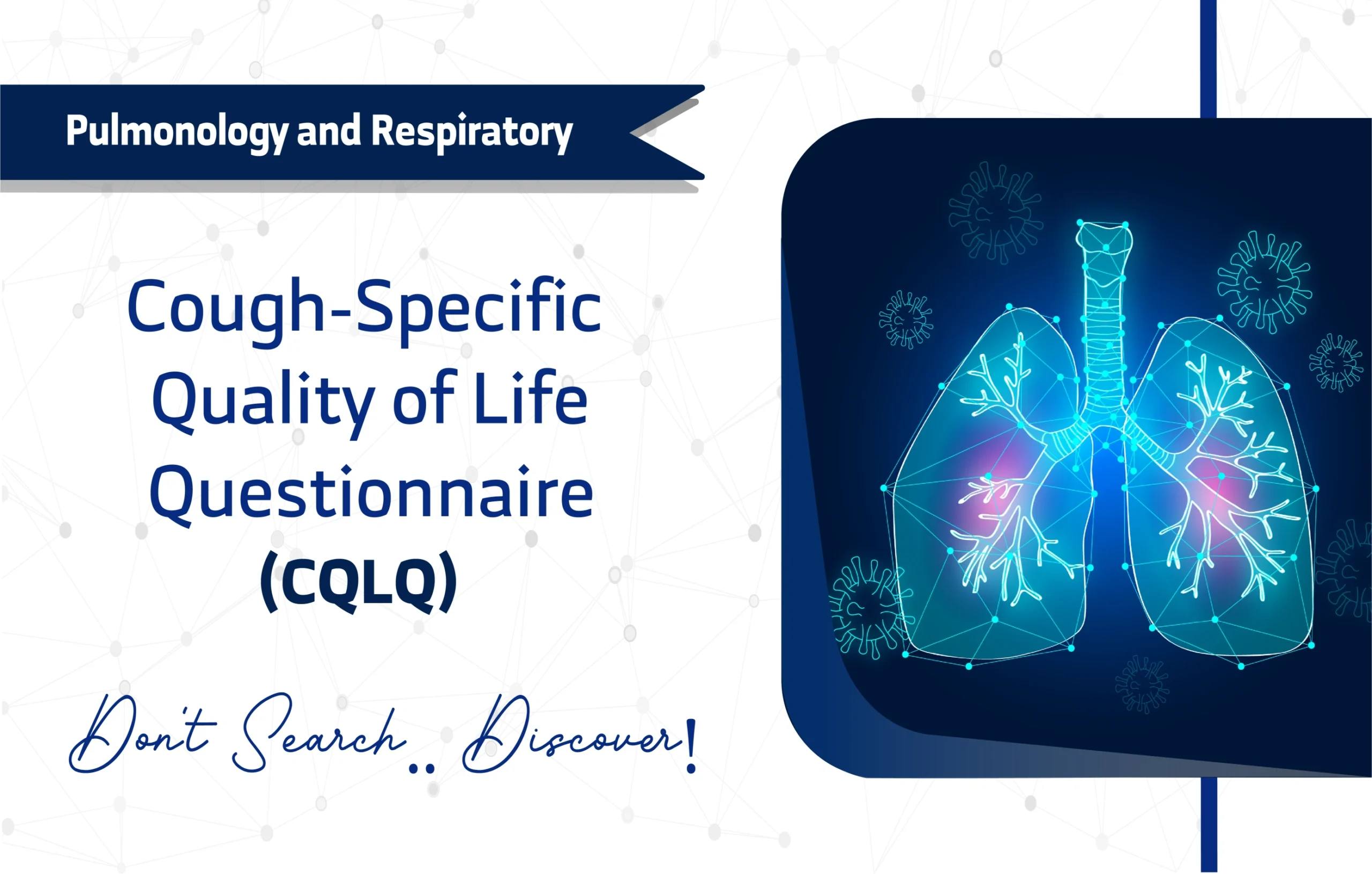Introduction
Chronic cough affects millions, significantly impacting health-related quality of life (HRQoL). Consequently, the Cough-Specific Quality of Life Questionnaire (CQLQ), developed by Cynthia T. French, Richard S Irwin et al, in 2002, emerges as a critical tool for assessing this impact. Published in CHEST journal, American college of chest physicians, the CQLQ has garnered over 400 citations on Google Scholar, reflecting its robust validation and widespread use in pulmonology research and clinical practice (French et al., 2002).
This article provides a detailed guide to the CQLQ, offering researchers and clinicians actionable insights into its structure, applications, and value in improving patient outcomes.
Key Features of the Cough-Specific Quality of Life Questionnaire (CQLQ)
Purpose and Use
The CQLQ measures the impact of chronic cough on HRQoL, specifically targeting adults with conditions such as asthma, gastroesophageal reflux disease (GERD), postnasal drip, or idiopathic cough. Unlike general quality-of-life tools, its focused design ensures relevance for cough-related issues, making it indispensable in pulmonology.
Target Population
The CQLQ suits adults aged 18 and older with chronic cough. Specifically, it targets:
- Young Adults (18-24 years)
- Middle-Aged Adults (25-44 years)
- Older Adults (45-64 years)
- Seniors (65+ years)
- Patients with asthma, GERD, postnasal drip, or idiopathic cough.
However, it lacks validation for acute cough or pediatric populations.
Structure
The CQLQ comprises 28 questions, each question evaluates the patient’s experience with cough-related issues over a recent time period, covering multiple dimensions of cough’s impact:
- Physical Symptoms: Includes exhaustion, pain, and sleep disruption.
- Psychosocial Impacts: Addresses embarrassment and social challenges.
- Functional Limitations: Evaluates interference with daily activities, work, and social interactions.
- Emotional Responses: Captures worry and emotional distress.
- Extreme Physical Manifestations: Assesses issues like incontinence.
- Safety Concerns: Examines cough-related safety risks.
Each item uses a 4-point Likert scale (1 = strongly disagree, 4 = strongly agree), producing a total score from 28 to 112.
Scoring Method
The CQLQ employs a 4-point Likert scale for its 28 items, with scores ranging from 28 to 112. Specifically:
- Scoring: Sum the responses (1 = strongly disagree, 4 = strongly agree).
- Interpretation: Lower scores indicate better HRQoL, while higher scores suggest a greater negative impact.
Although no universal cut-off scores exist, clinicians can use total or subscale scores to identify specific areas of concern, such as physical symptoms or psychosocial impacts, guiding targeted interventions.
Administration Format
The CQLQ offers flexible administration options, ensuring accessibility in various settings:
- Paper-based forms
- Digital (online) platforms
- In-person interviews
Typically, it takes 5–10 minutes to complete, making it practical for busy clinical environments.
Applications of Cough-Specific Quality of Life Questionnaire (CQLQ)
The CQLQ serves multiple purposes in clinical and research settings:
- Monitoring: Tracks changes in HRQoL over time or during treatment.
- Research: Supports studies on chronic cough’s impact and treatment efficacy.
For example, a high score in the psychosocial domain might prompt counseling to address embarrassment or social isolation.
Languages and availability
The CQLQ is available in:
- English
- Spanish
- Japanese
- German
- Hungarian
- Polish
- Romanian
However, language availability may limit its use, necessitating further translations.
The CQLQ requires permission from the American College of Chest Physicians for use. While it may be free for non-commercial purposes, commercial or funded academic projects might incur licensing fees.
Reliability and Validity
The CQLQ demonstrates strong psychometric properties. Notably, validation studies confirm its reliability and. With a Cronbach’s alpha of 0.70, it exhibits high internal consistency. Moreover, its sensitivity to cough-specific issues ensures accurate assessment, making it a reliable tool for both clinical practice and research.
- Original validation study: study link
Limitations and Considerations
Despite its strengths, the CQLQ has a few limitations:
- Self-Report: Responses may be influenced by personal interpretation.
- Language Barriers: Limited to English, restricting use in diverse populations.
- Age Restrictions: Not validated or suitable for acute Cough or pediatric patients.
- Cultural Bias: The questionnaire may not fully account for cultural differences in how cough-related issues are perceived or reported.
- Social Desirability Bias: Patients may underreport symptoms to present themselves more favorably.
Other Versions And Related Questionnaires
The CQLQ complements other cough-related tools, including:
- Leicester Cough Questionnaire (LCQ)
- Visual Analogue Scale (VAS)
- Chronic Cough Impact Questionnaire (CCIQ)
- Cough Severity Index (CSI)
These tools offer alternative or supplementary approaches to assessing cough severity and impact.
Additional Resources
For more information on the CQLQ and to access the full questionnaire, visit the following resources:
- Original Validation Study: Study Link
- Further validation study:
- Validation of the CQLQ in patients with idiopathic pulmonary fibrosis study link
- For inquiries, contact Richard S. Irwin at irwinr@ummhc.org
- For additional CQLQ resources, consult the American College of Chest Physicians
Frequently Asked Questions (FAQ)
- Who can use the CQLQ?
Clinicians, researchers, and healthcare providers use the CQLQ for adults aged 18 and older with chronic cough. - How long does it take to complete the CQLQ?
Patients typically take 5–10 minutes to complete, making it feasible for clinical and research settings. - How is the CQLQ administered?
Healthcare teams can administer it via paper, digital, or interview formats, offering flexibility. - Is there any cost to using the CQLQ?
The CQLQ requires permission from the publisher, with potential fees for commercial or funded academic projects.
A word from ResRef about Cough-Specific Quality of Life Questionnaire (CQLQ)
The Cough-Specific Quality of Life Questionnaire (CQLQ) represents a well-validated, reliable instrument specifically designed to assess the impact of cough on quality of life. Its comprehensive coverage of physical, psychological, and social dimensions makes it particularly valuable for both clinical practice and research settings. However, language availability, while growing, may still limit use in some regions, and it may require additional validation studies.
References
- French CT, Irwin RS, Fletcher KE, Adams TM. Evaluation of a cough-specific quality-of-life questionnaire. Chest. 2002 Apr;121(4):1123-31. doi: 10.1378/chest.121.4.1123. PMID: 11948042. link
- Lechtzin N, Hilliard ME, Horton MR. Validation of the Cough Quality-of-Life Questionnaire in patients with idiopathic pulmonary fibrosis. Chest. 2013 Jun;143(6):1745-1749. doi: 10.1378/chest.12-2870. PMID: 23519393; PMCID: PMC4694113. link








